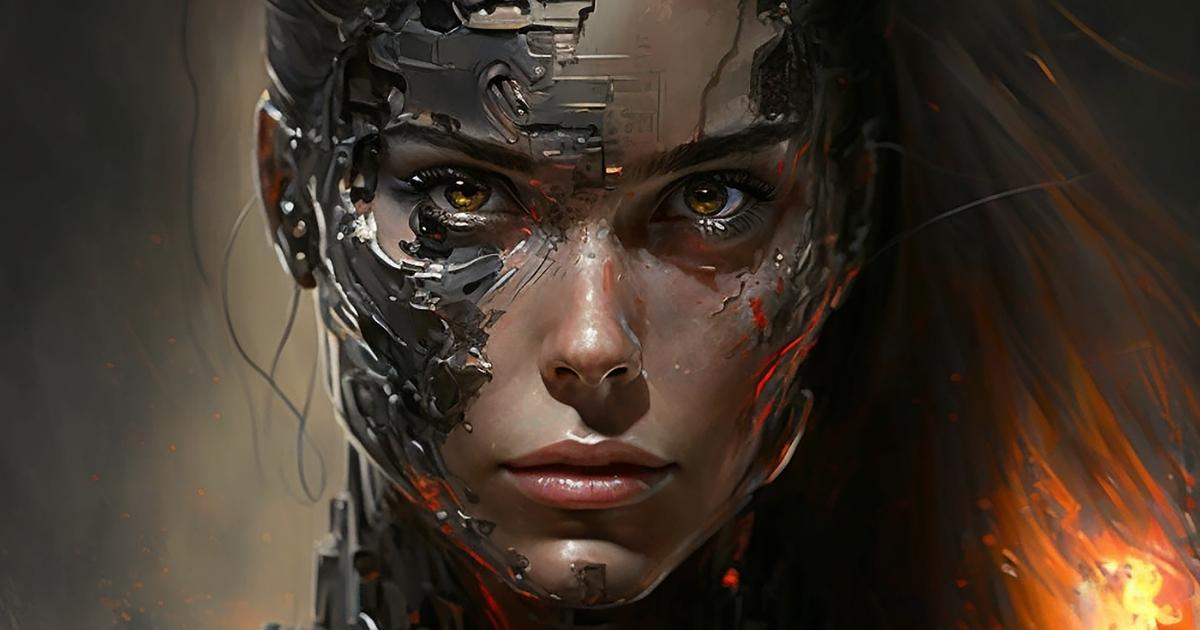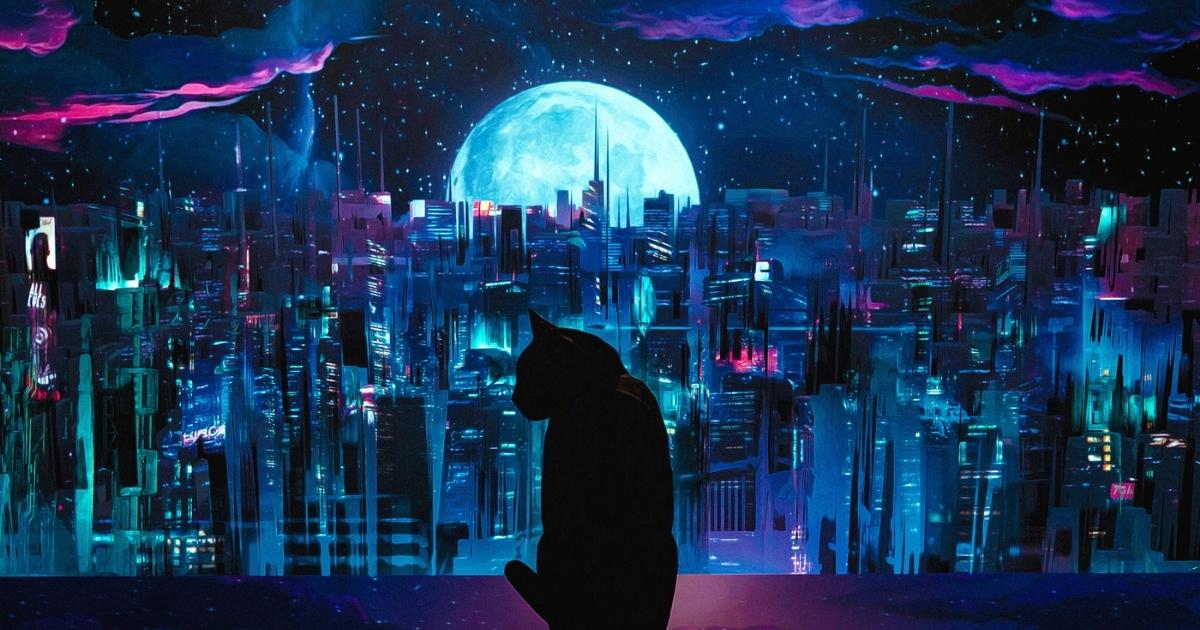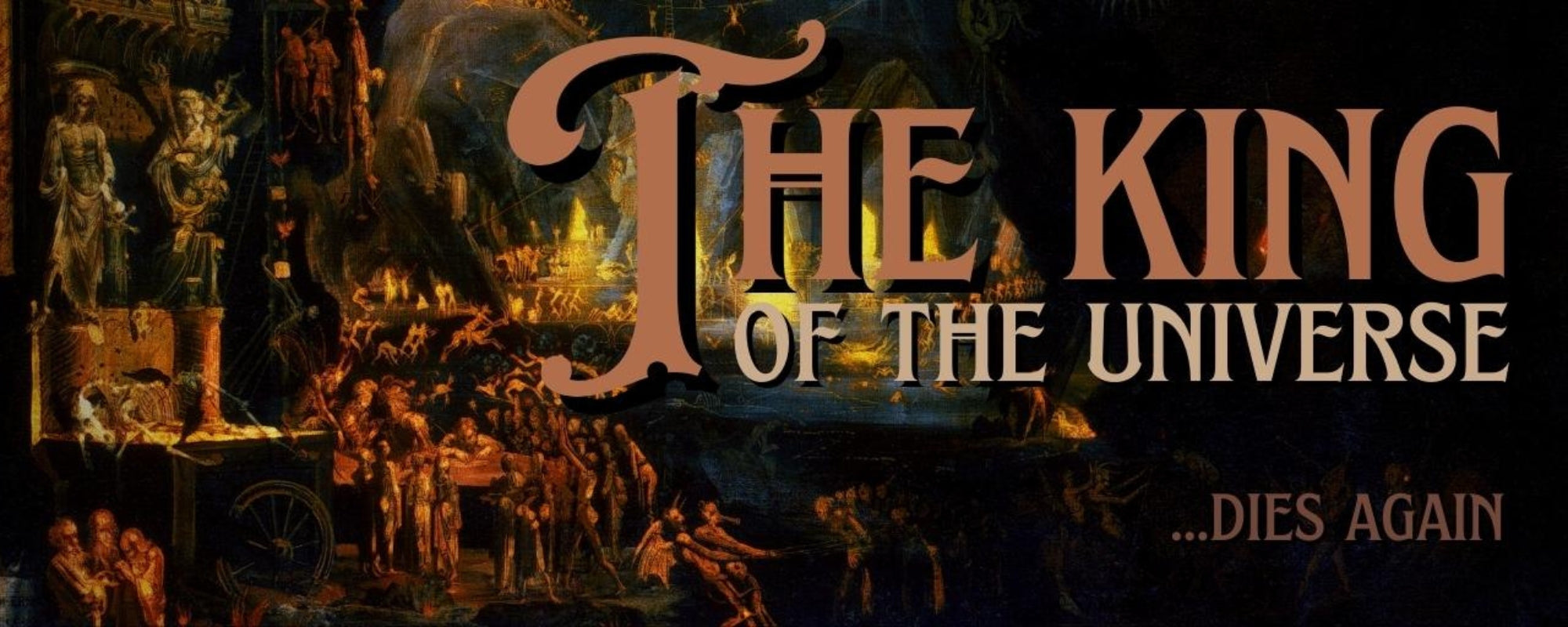
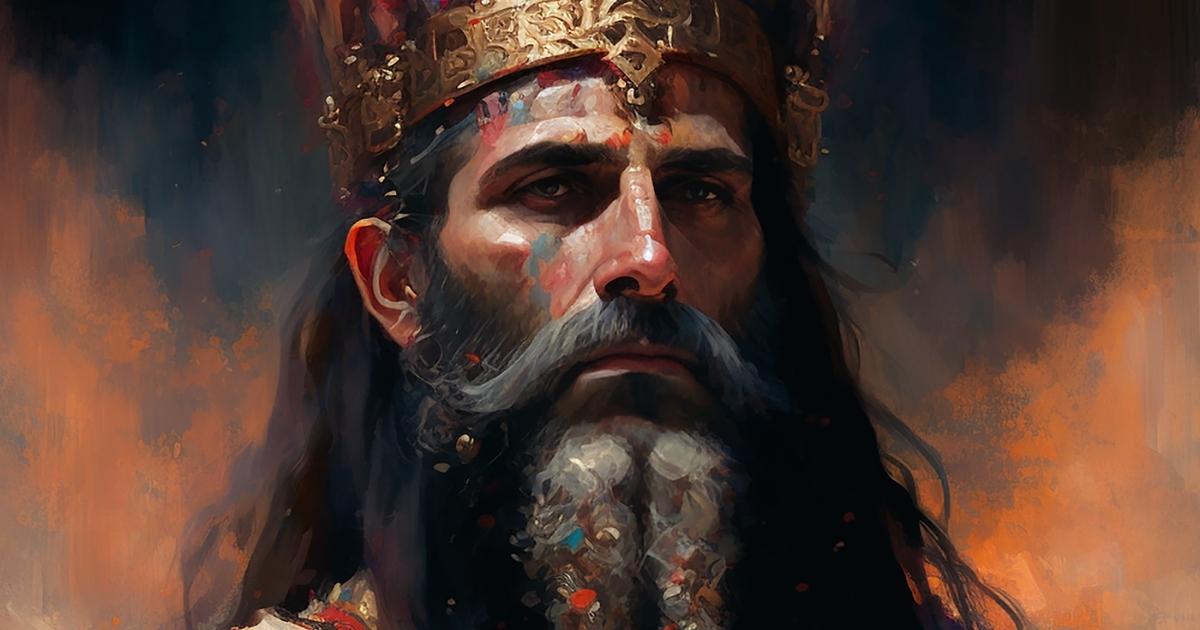
The King of the Universe Dies Again
By Kay Vaindal
One hundred years after eight billion of us died in the Great Atmospheric Event, I began hooking up with ancient Assyrian king, Esarhaddon.
Maybe I would have gotten around to it sooner had my first ten years not been consumed by waiting in line to get an ID. Never had the Otherworld seen so many Newcomers at once. Whatever happened to the atmosphere killed 99.999% of humans in about twenty minutes, leaving all other species untouched. Our entry to the Otherworld unbalanced its every corner, and the archaic filing system buckled under our weight. There are no computers in the Otherworld. There is paper, because trees were alive once and can be ghosts. But cobalt has never breathed, so they wrote down by hand the names of the eight billion dead, one by one by one. The process took thirty-five years to complete.
I met Esarhaddon at a seedy bar in the part of the Otherworld where people who’ve been executed like to stay. There’s a stickiness to our final trauma. Car crash victims aggregate with car crash victims, and prefer to sit high in the clouds. Cancer patients occupy a city built from ghost wood near Milwaukee. And the ones who were executed—be it by brazen bull or lethal injection—inhabit a ruined town in the Sahara, hidden from mortals by sand. We see in layers of what was alive once, so sand is no concern. On any given square foot of land, I might see six old-growth trees on top of ghost crops, long since harvested, and on top of them all, a mortal secondary forest bathed in yellow light.
I passed through the sand into the Town of the Executed looking for Atahualpa. I would interview him for my award-winning newsletter, which curious other Newcomers such as Adam Curry have called enlightening…a joy…and the best thing to come of the end of humanity. At the time, I’d interviewed Attila, Askia the Great, and Abraham Lincoln. The A-name theme had been fully unintentional, but for my fourth article, I had decided to stick with it. Because Atahualpa had been strangled against a pole by a vindictive Spaniard, I imagined I would find him among the executed.
Maybe I would have if I had looked longer, but there was Esarhaddon—perhaps wishing his older brothers had killed him when they had tried, just before his ascent to the throne—sipping a beer made from ghost hops in a ghost-wooden goblet, like he belonged.
So, I figured I’d have it be a vowel-name theme, rather than an A-name theme, and I interviewed Esarhaddon instead. I didn’t know much about him. I taught high school AP World History when I was alive, but we only focused on the big names. The Alexander the Greats and the Aminatores, neither of whom I’ve been able to find. Esarhaddon was a minor character in history, and I knew him not from his conquest of Egypt, but from a smaller footnote: his many illnesses, mental and physical. Most notably, he is the first person whose death by depression is backed by a written account.
In the hotel room where I interviewed him, we talked about it. He told me his fears, and they sounded like my fears, and we drank the wine of dead grapes, and we ended up in bed.
Perhaps that was unprofessional of me.
Now, I’m taking him to the ghost doctor. We’ve been dating twenty-two months. Ghosts have little use for doctors, but dead doctors refuse to stop being doctors, maybe for occasions just like this one, so we float up I-95 from my home in the overgrown ruins of Washington, D.C., to a ghost practice in the overgrown ruins of Bethesda. I tell him how cars used to zip up these roads. He says, what roads? Because he can scarcely see the mortal scaffolding our world sits on after being so long apart from it. Essarhadon’s ghost, I am sure, is dying.
This is of grave concern because ghosts don’t die, I’ve learned in my hundred years. In some circles, they delight in reenacting their deaths. Murder victims, I’ve been told, find a certain catharsis in driving ghost-wooden knives into one another, or by pointing finger guns and mimicking gunshots.
A flock of ghost birds flies over our heads, and a pack of ghost wolves runs cheerfully up the road, yapping and looking back our way. Esarhaddon sees them, at least. I see him tense. The ghost animals are becoming scarce. Birth rates of wolves and birds and everything are up since the Great Atmospheric Event took the humans away. The trees are disappearing here too, souls going to repopulate the mortal world. When I focus in on the real, I see forests reclaiming the crumbled cities.
Esarhaddon says it’s a choice to go back. Some do it regularly. Some don’t. But almost all ghosts eventually return.
Human birth rates in the mortal world, meanwhile, are at their lowest levels in four thousand years. The survivors of the Great Atmospheric Event—SCUBA divers and military submariners mostly, saved from the toxin by the air in their tanks and the leagues of water between them and the sky—are few. We’re generations post-SCUBA people now, and the children of the SCUBA people are of fewer number than the survivors, and the grandchildren fewer than them. There are sixty-two pregnant women on Earth right now, and all known fetuses are spoken for.
I once met ghost celebrity Edie Adams at a bar. She’s a fan of my newsletter. Edie Adams cares deeply about the fate of humanity. She swept a hand at the ghost world and said, “We don’t see any mammoths here, do we? Dinosaurs? What happens to us here, when those last humans die?”
There’s a movement among ghosts to interfere with the human birth rate. Many who died in the GAE support this movement, as they’d like to return to the mortal world as soon as possible. This is a normal response to dying, say the veterans, but they’ll have to wait their turn. The ghosts involved in the movement refer to themselves as Lifers. The Lifers stage complex meet-cutes between surviving humans in their post-apocalyptic world. They put thoughts of babies in the heads of men and women. They light candles, and drop flower petals on beds, and poke holes in goat-bladder contraceptives.
Long before the GAE ghosts arrived, the leaders of the Otherworld decreed that all who interfere in human affairs shall be exiled. They shall be stripped of their ID and forced to wander aimless and alone, for all eternity.
This fate does not scare the Lifers.
Esarhaddon and I arrive at the ghost doctor. She is blessedly a twenty-first century practitioner, though Esarhaddon argued that only his chief exorcist could cure him of this cloud. He suggested that we find a ghost who looks like him to put in his bed and absorb his bad vibes, and then slay the look-alike. I reminded him ghosts cannot die. He said it would be a symbolic gesture.
The ghost doctor sits Esarhaddon on a bed made from ghost trees. She stares at him.
I am about to say, “What is this staring? Is this helpful?” Because what can a ghost doctor do? We have no pulse, and no need for nutrition, and any injury to our bodies will heal to their most complete state after only an hour or two of sleep. But before I can, the doctor clears her throat.
“He is dissolving,” she decrees.
“I am dissolving?” says ancient Assyrian king Esarhaddon, swinging his legs off the edge of the cot.
“It can happen,” says the ghost doctor. She wears a wooden stethoscope over her shoulders for no reason. “Even we decay.”
Esarhaddon pulls his lips into his mouth. He looks at the office around us, built from dead wood, and I wonder what he sees. Perhaps he can see the magnificent dead tree whose trunk we stand inside, but not the asphalt parking lot under my feet, crumbled, and the seeds of new-growth poking through.
“What can we do?” I ask the doctor.
“He’ll have to take a new body,” she says. “Otherwise, he’s gone for good.”
Esarhaddon makes a low, long sound like hmm.
On the float home, he laments. So long world, he says. So long cruel world. Goodbye world. I won’t miss this terrible world.
By the time we arrive at the edge of the ruins of D.C., I’m tired of hearing it. I close myself off in one bedroom of the two-bedroom apartment we’ve been haunting for a few months now. There, I pen a letter to Esarhaddon’s eldest child, Serua-etirat, who inhabits a cemetery in Iraq. I give it to a courier who will float it across the world and into her hands in three days’ time.
Later in the night, Essarhadon and I settle onto a mortal couch to read our books. Some days, I imagine the mortals who lived here, picking out this couch, carefully selecting the horrible green velvet. He does not see the couch, but I suspect he knows it’s there via muscle memory.
“So, you’ll die?” I say to him after fifty pages.
“I have already died,” he says without looking up.
“You’ll die again?”
“I will die again.”
“You’ll do nothing again?”
“There is nothing to do,” he says, putting the book down.
“You can be reborn,” I say.
“I do not want to talk about this,” he says.
In a weeks’ time, his right hand turns to dust, falling from his body like ash from the end of a cigar. As much as he sleeps, it does not re-grow. We visit the ghost doctor again, and again she says there’s no cure, only rebirth. So, Esarhaddon turns the pages of his books with his left hand.
Serua-etirat arrives the following day, her hair tied up in its usual dramatic fashion. “Father,” she says sternly. “You’d do this to me again?”
“I have done nothing to you,” says Esarhaddon.
“Yes, you have done nothing,” says Serua-etirat. “And you will do nothing again. It’s all you ever do, nothing.”
This enrages Esarhaddon. He roars on his accomplishments: the conquest of Egypt; the rebuilding of Babylon, Nippur, Akkad, and Borsipia, after his father’s destruction; the ascension of his sons. I’ve heard it all before, so I look out the window and watch a group of destitute mortals hunt a white-tailed deer through the ruined streets.
“So many of Mother’s accomplishments you pass as your own,” says Serua-etirat.
Esarhaddon seethes and sends her away.
As she leaves, she says, “You will not do nothing.”
He closes himself in the other bedroom for the next hundred days, evidently a habit he’s carried with him all his life. During this time,
Serua-etirat begins to inhabit the apartment upstairs to ours, growing more enraged at her father’s isolation with each day. She calls her mother and siblings to join her. Esarhaddon’s wife, Esharra-hammat, died three years before him. He will always love her, and she him, but monogamy is rare in the Otherworld. She now haunts an abandoned inn in Costa Rica, with deceased author Henrik Ibsen.
Late one night, lying on the couch, armless, his head in my lap, Esarhaddon says to me, “I will forget myself.”
“Hm?” I say.
“If I am reborn, I will forget myself.”
“You’ll remember once you die,” I say. “Then you’ll be both your selves, and should you choose, you could be Esarhaddon again.”
“I have only been Esarhaddon.” After this, he says his usual tirade: I am Esarhaddon, king of the Universe, king of Assyria, mighty warrior, first among all princes, son of Sennacherib, king of Assyria, grandson of Sargon, king of the universe, king of Assyria. And so on. He leans on it more with each passing day, as his soul turns further to dust.
I know this about him: Esarhaddon has lived one life and one life only. I, like many others killed in the GAE, have also lived just once. Serua-etirat has lived three lives. Abraham Lincoln, like a cat, has returned to the mortal scaffold nine times, most recently as famous model Anna Nicole Smith, though he still prefers to appear as Lincoln in the Otherworld. Esarhaddon fears mortals. I say as much.
He doesn’t roar like he would if Serua-etirat had said it, or any of his other daughters or sons. He lies there, benignly staring up at a ceiling fan he can’t see. He scratches his beard. Then he says, “There is no one to be reborn into.”
He’s right.
I get lunch with Edie Adams later that week. We don’t need to eat lunch, because we’re ghosts, but we sit side by side and sip green juice from wooden cups, regardless. I ask her about the birth rates. Declining still, she tells me. I ask her if she knows of any pregnant women. She does. Any pregnant women whose fetuses aren’t claimed?
“Are you seeking rebirth, Jennifer?” says Edie.
“Not me,” I say.
“A boy, then,” says Edie Adams.
“Esarhaddon, king of Assyria, yes.”
She laughs. “I’ll see what I can find. Keep an eye for a courier.”
Days go by and Esarhaddon’s left leg turns to dust. He is a torso, a head, and one leg now, lying on the couch feeling sorry for himself, and I’d really like to leave him if it wasn’t such a tactless move. In the morning he laments, Could this be the last morning of Esarhaddon? At night he laments, Could this be Esarhaddon’s final sunset? And so on. His family members come and go, bringing wine and ghost cherry tomatoes. Even his brothers, who he sent to the Town of the Executed many centuries ago, come to pay their respects.
One morning that could be the last morning of Esarhaddon, a note arrives from Edie, instructing that I meet her near San Jose.
I elect to tell Serua-etirat, who puts a hand on her hip and frowns out the window of our apartment. “You’d leave him now?”
“It’s for his own good,” I tell her, and explain our mission.
Serua-etirat comes along with me to San Jose. We float through the clouds, dense flocks of ghost birds and car crash victims. “We really ought to be strategic about this,” she says as we cross the Mississippi. “My father’s soul is not the leader humanity needs.”
I ask her to clarify.
“I watched Assyria tear itself in half, and I could do nothing, because I am a woman,” she says. “I could not be king, and my brothers were weak and quarrelsome just like these scrounging mortals are weak.”
I don’t know what to say, so I say nothing.
“I can do something now, and I will.”
I nod. As I am talking about saving her father, I imagine she’s also talking about saving her father. “You can,” I say. I will soon learn she is not, in fact, talking about saving her father.
We meet Edie Adams on an abandoned buffalo ranch where the animals have reverted to the rugged ways of their ancestors, multiplying fruitfully, refusing to graze on cheatgrass in favor of rolling wheat—and so rolling wheat dominates the mortal scaffold here now, dancing beautifully in the wind.
“This is where she is,” says Edie Adams.
“The pregnant one?” says Serua-etirat.
“No one knows about her,” says Edie Adams.
She leads us into an old ranch house, front porch sloping to meet the soil. We float past a barricaded door. Inside are stacks and stacks of canned food, and a young, swollen woman asleep on a cot, and a man slumped by the door with a gun.
“Why does no one know about her?” I ask.
“She doesn’t go outside,” says Edie.
I’d like her to elaborate on that further, but before I can, Serua-etirat asks, “When is she due?”
“Soon,” says Edie.
“I’ll go and get Esarhaddon,” I say.
Serua-etirat looks at me, bewildered. She looks at Edie next. Then she scratches the corner of her mouth and says, “Yes, hurry.”
It takes me half-a-day to float back to the east coast, where winter has set in, white sky like a ceiling over the world. I collect the ancient king and carry him back toward California, which takes two days’ time thanks to his weight and the jet stream. We overnight in Milwaukee, in the home of my aunt who died when I was young. She looks at Esarhaddon with her teeth together, perhaps reminded of her time on the mortal plain and her own limb which preceded her into this world.
We leave in the early morning, reaching the ranch house by dinner time.
I place Esarhaddon’s ghost body down on a ratty couch. Serua-etirat and Edie are missing, and so is the man with the gun. The pregnant woman lays on her cot, squeezing and relaxing a fist at her side. Her face, normally brown, has turned a sort of gray, shining with sweat. She is pushing, crying, and no one is there.
I can see through her, and I can see that the fetus inside her is pointing feetfirst toward the birth canal. I am not a Lifer. I fear wandering alone.
I watch her turn grayer and grayer. On the couch, Esarhaddon’s final leg disintegrates. I’m reminded of the brown brittle stars I would find in the twelve-foot whaler I took out into the marsh with my father a century ago. If you handled the brittle stars too much, their many tentacles would fall off until they were only a button.
I wonder where the man with the gun is. I wonder where Edie the Lifer is. I wonder where Serua-etirat is to watch her father pass into nothingness. I imagine this will all make for a good article for my newsletter, a different form than usual, perhaps more formal, out of respect for the deceased, and I elect right then to write it.
The woman takes a shuttering breath, her mouth pressed and lips cracked, and then she looks right at me.
Our eyes meet.
A mortal shouldn’t see me, but she’s staring, skirting the boundary between life and death. Through her dry lips she croaks out something like ayudame.
I don’t speak Spanish, so my excuse will be that it’s an intrinsic response. Instinct. A woman helping a woman. I reach inside her womb with my ghost hands and point the fetus’s head toward the exit. The whole time, she stares at me. With one terrible scream, a baby girl falls out of her, placenta next, staining the cot red. The young mother slumps, leaving the baby to wail in the blood between her legs.
She’s alive, I know. Exhausted and bleeding, but alive. This is the granddaughter of a survivor of the GAE, and the great-granddaughter of a survivor of the GAE, soulless now, but soon to be inhabited by the king of the Universe, king of Assyria, mighty warrior, first among all princes, etc. They will survive this.
Rebirth needs to happen within a day of birth, or else the baby will grow a new soul from scratch. Esarhaddon lies motionless on the couch. I hope he wakes up soon.
Edie Adams bursts in with a mocha latte made from ghost cow cream and ghost coffee beans, Serua-etirat beside her. “Did we miss it?” asks Edie.
I jerk my chin toward the mother and baby, asleep and crying respectively.
“Not an easy labor,” says Serua-etirat. She runs a hand through her hair. Then she disappears.
The pitch of the baby’s cries increases and it’s only then that I realize that when Assyrian princess Serua-etirat said days ago that she’d do something, she did not mean to save her ailing father. Serua-etirat, now a baby screaming on a bloody cot, meant instead that she might save mankind.
On the couch, Esarhaddon passes peacefully out of existence, as he did once before.
On the bed, the mother whispers gracias and weakly touches her newborn’s head.
The man with the gun bursts through the door, dragging the corpse of an antelope. He drops it when he sees his bloody wife and her bloody baby. A ghost antelope hops through the door after him, bewildered.
Edie Adams slurps her latte. She looks at me and then shrugs. “Strange times, aren’t these?” she says.
“Strange times,” I agree.
Copyright © 2023 Kay Vaindal
The Author
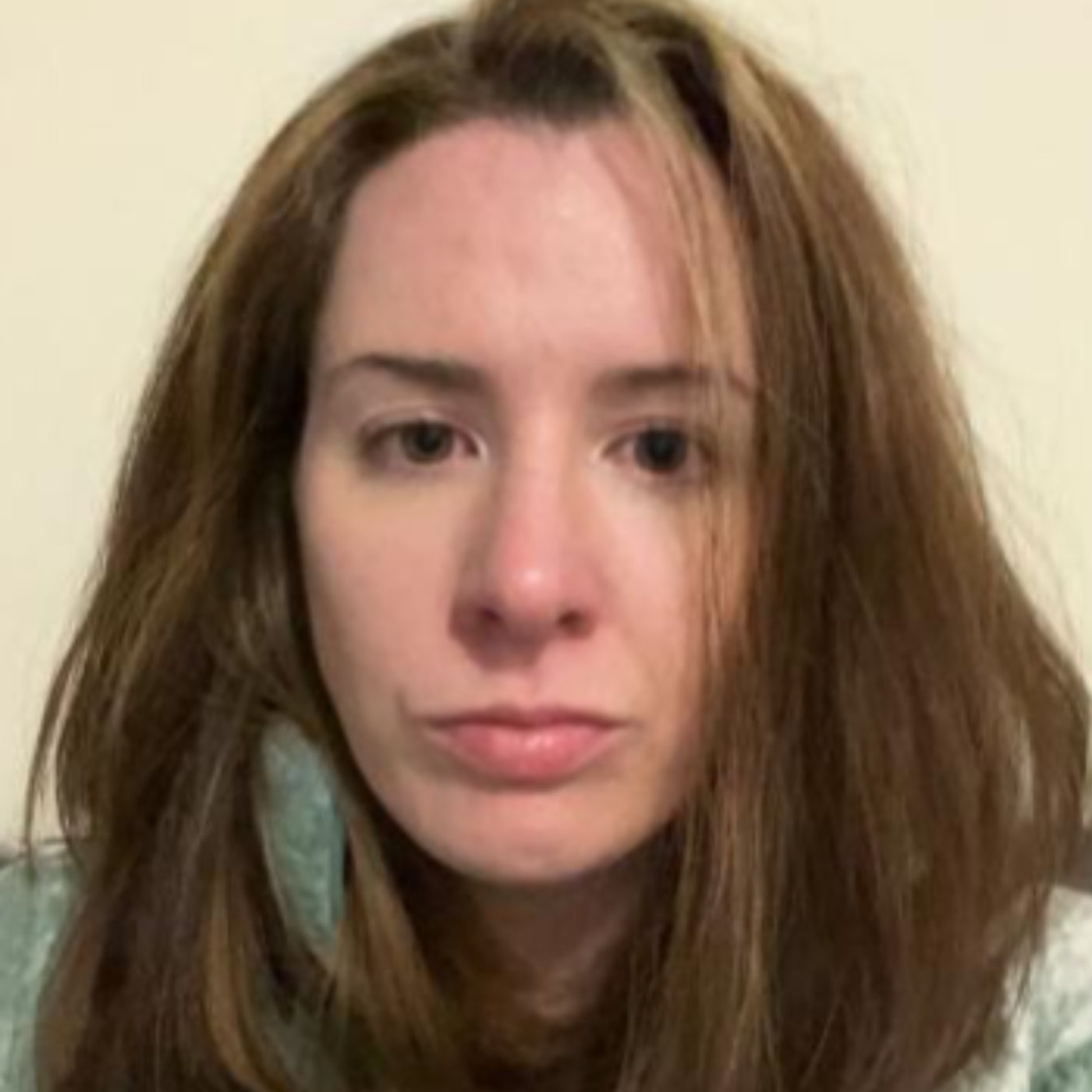
Kay Vaindal


